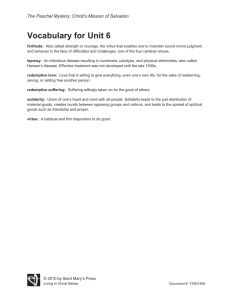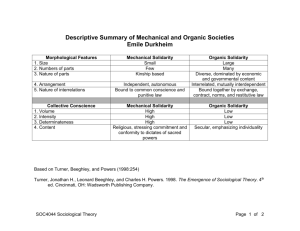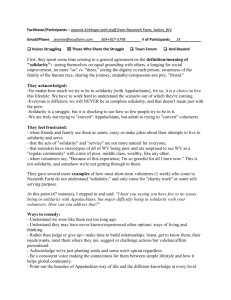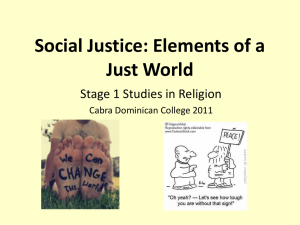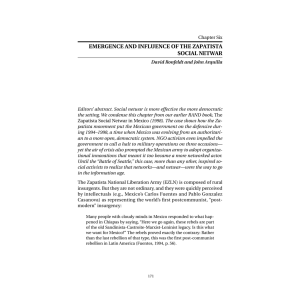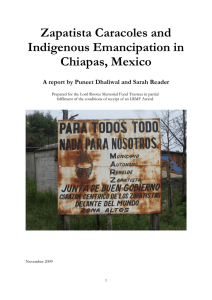Chaminade-Cha-Kim-Aff-Fullerton
advertisement
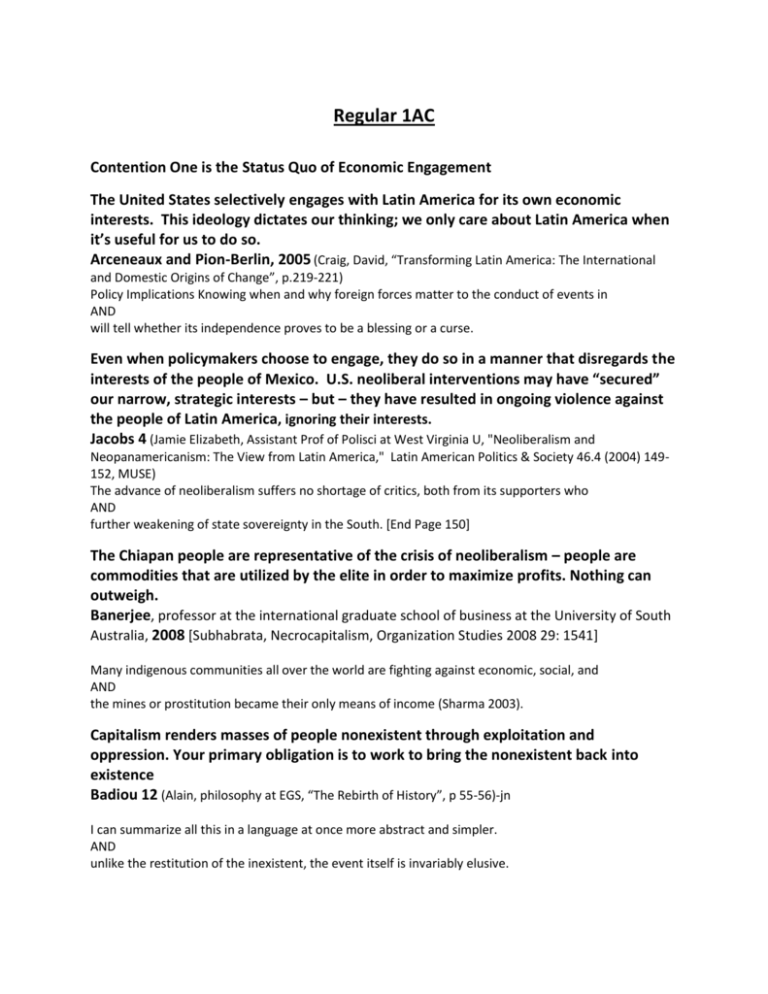
Regular 1AC Contention One is the Status Quo of Economic Engagement The United States selectively engages with Latin America for its own economic interests. This ideology dictates our thinking; we only care about Latin America when it’s useful for us to do so. Arceneaux and Pion-Berlin, 2005 (Craig, David, “Transforming Latin America: The International and Domestic Origins of Change”, p.219-221) Policy Implications Knowing when and why foreign forces matter to the conduct of events in AND will tell whether its independence proves to be a blessing or a curse. Even when policymakers choose to engage, they do so in a manner that disregards the interests of the people of Mexico. U.S. neoliberal interventions may have “secured” our narrow, strategic interests – but – they have resulted in ongoing violence against the people of Latin America, ignoring their interests. Jacobs 4 (Jamie Elizabeth, Assistant Prof of Polisci at West Virginia U, "Neoliberalism and Neopanamericanism: The View from Latin America," Latin American Politics & Society 46.4 (2004) 149152, MUSE) The advance of neoliberalism suffers no shortage of critics, both from its supporters who AND further weakening of state sovereignty in the South. [End Page 150] The Chiapan people are representative of the crisis of neoliberalism – people are commodities that are utilized by the elite in order to maximize profits. Nothing can outweigh. Banerjee, professor at the international graduate school of business at the University of South Australia, 2008 [Subhabrata, Necrocapitalism, Organization Studies 2008 29: 1541] Many indigenous communities all over the world are fighting against economic, social, and AND the mines or prostitution became their only means of income (Sharma 2003). Capitalism renders masses of people nonexistent through exploitation and oppression. Your primary obligation is to work to bring the nonexistent back into existence Badiou 12 (Alain, philosophy at EGS, “The Rebirth of History”, p 55-56)-jn I can summarize all this in a language at once more abstract and simpler. AND unlike the restitution of the inexistent, the event itself is invariably elusive. Thus, John and I affirm solidarity with the Zapatista Army of Liberation (EZLN) in Chiapas, Mexico. In 1994, a group of indigenous people in Mexico and disgruntled Mexican citizens marched on the government in reaction to the North American Free Trade Agreement. They demanded that the state no longer ignore them, and provide for the needs of their people. This declaration of war against these policies marked an eventual rupture in the fabric of globalization. Nail 12 (Thomas, postdoctoral lecturer in the Philosophy Department at the University of Denver, “Returning to Revolution”, ed. Claire Colebrook et al., p 102-103)-jn It is also possible, however, that revolutionary interventions really split political life down AND is acknowledged but ultimately staved off through mediating forms of compromise and representation. Through this solidarity, we connect ourselves with the Zapatistas, which means we connect ourselves with a nonviolent protest against this oppressive domination Maccani 8 (RJ Maccani, senior reporter in NYC, working both for news organizations and resistance groups, from the newsletter, “Solidarity: What does it mean now? May/June 2008,” “Be a Zapatista Wherever You Are,” http://www.resistinc.org/newsletters/articles/be-zapatista-wherever-you-are,) Behind our black mask, behind our armed voice, behind our unnamable name, AND powerfully and clearly in their "Everything for everyone, nothing for ourselves." Zapatistas urge international solidarity to combat the totality of global neoliberalism Paulson, Justin 2001 “Peasant Struggles and International Solidarity: The Case of Chiapas” Socialist Register. 285-86 ¶ Nor should one accept the view that those who do act in solidarity thereby AND —¶ so far—a capacity to endure and evolve within the struggle. We should recreate debate as a pedagogical space beyond the ideological parameters of neoliberalism. This is the only way to change the world—each and every instance is key. Rodriguez 9 (Arturo, professor in the College of Education at Boise State University, “Anti-capitalist Analytical Fusion: Science, Pedagogy and Revolution”, Journal for Activist Science & Technology Education, volume 1, number 2, pp. 48-58)-jn-gender+disability modified If the above resembles a rant consider why a string of words that includes political AND more importantly, offer an alternative to the living currently destroying the planet. It’s a question of resonance—our speech act is key to criticize United States selective engagement. Every little action is key. Nail 12 (Thomas, postdoctoral lecturer in the Philosophy Department at the University of Denver, “Returning to Revolution”, ed. Claire Colebrook et al., p 165-168)-jn Transversal Relays Thus, if solidarity is possible, how does it work? By AND heterogeneous political conditions (never merging but becoming more or less transversally identical). Debate is key—it brings a new form of communication and activism (Mark Gelsomino,2010 Mark is a recent graduate of the Masters of Information Studies program at the University of Toronto. In addition to his studies he sat on the executive of the Canadian Library Association U of T Student Chapter and served as co-chair for the U of T Librarians Without Borders chapter. Prior to coming to Toronto, Mark worked as a Systems Specialist for the Ottawa Public Library. He completed his Anthropology undergrad at Carleton University where he focused on criminology, forensic psychology and Indigenous issues, “The Zapatista Effect: Information Communication Technology Activism and Marginalized Communities” http://fiq.ischool.utoronto.ca/index.php/fiq/article/view/15404) Instead of running for office, the EZLN sought to influence the decision-making AND new forms of communication would allow them to side-step traditional practices. And, ordering with obedience is a political praxis that allows for a pragmatic politics of the now – questions of long-term solvency frame systemic impacts as normalized functions of institutions. Only the aff can allow for critical analysis that interrogates institutions of domination. Wagner and Moreira 3 Valeria, professor of Hispanic studies at the University of Geneva, and Alejandro, Fall 2003, “Toward a Quixotic Pragmatism: The Case of the Zapatista Insurgence”, boundary 2, Volume 30, Number 3, pg. 205-207) That there is no foreseeable future to revolutions, "no recipes, lines, AND " is today, not tomorrow; their "moving principle," now. And, solidarity and collective agreement is necessary for an ideological shift in political praxis to occur – only by assuming a pragmatic form of revolutionary politics like that of the Zapatistas can we begin to change the capitalist status quo. Wagner and Moreira 2003 [Valeria Wagner and Alejandro Moreira, Towards a Quixotic Pragmatism: The Case of the Zapatista Insurgence, PDF Academic Journal, 2003, http://muse.jhu.edu.proxy.lib.umich.edu/journals/boundary/v030/30.3wagner.html] "As Che Guevara would have said: ‘When the dream of evolution dissipates AND nor the same revolution, that is associated with the image of Che. A necessary prerequisite to increasing our economic engagement is creating a paradigmatic shift in the way that policies are formulated and passed. We must usher in a new wave of non-oppressive systems that incorporate the perspectives of those who truly make up Mexico. Cuninghame & Corona 1998, Patrick Cuninghame (Sociology lecturer at the Universidad Autonoma Metropolitana, A Hons degree in History from Edinburgh University, PhD in Sociology from Middlesex University) and Carolina Ballesteros Corona (psychologist and lecturer in pedagogy at the Universidad Pedagogica Nacional in the state of Mexico), A Rainbow at Midnight: Zapatistas and Autonomy, Pg. 14-16 January 1 1994 was chosen by the EZLN’s base support communities as the starting date AND from the political and economic institutions of both the state and the market.


